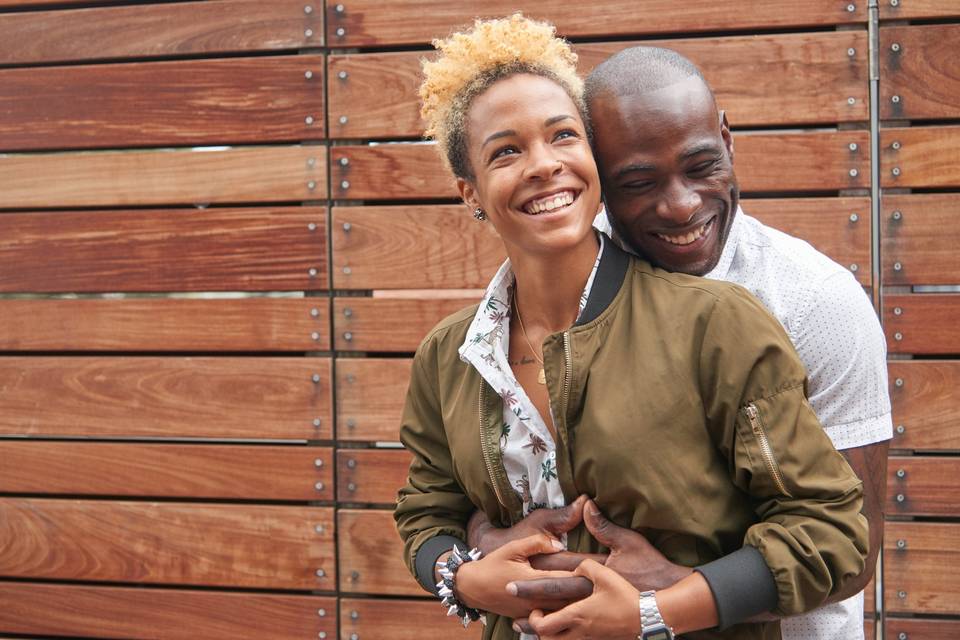Here's What Your Sleep Position Says About Your Relationship
To spoon or not to spoon?


Out of all the things you do with your significant other, the activity you probably spend the most time doing side-by-side is sleeping. After all, we spend about one third of our lives either sleeping or lying in bed, per research published in the journal Handbook of Clinical Neurology. Needless to say, sleep plays a huge role in relationships, since it affects nearly every aspect of our lives.
In fact, sleep has a significant role in emotional regulation and can seriously affect mood, explains Alex Savy, certified sleep science coach and founder of Sleepingocean. In fact, research published in the Journal of Sleep Research has shown a connection between sleep deprivation and a lack of empathy, which is certainly a recipe for a conflict in a relationship. Additionally, chronic sleep issues often lead to decreased sex drive, which can also impact a relationship, notes Savy.
Another factor that influences a relationship from a psychological point of view is sleep position—i.e how you and your partner are physically positioned together or apart while you’re sleeping. While there are all sorts of ways to sleep in a bed with your partner, one study by the University of Hertfordshire found that the most popular ones include sleeping back to back, sleeping facing the same direction and sleeping face-to-face. Wondering if your sleep position is good for your relationship? Here, experts break down the common sleep positions for couples—and what each says about the relationship.
Spooning
This is probably the most famous sleep position for couples, not only because it’s cute but also because it’s quite comfortable! It essentially involves both partners facing the same direction with the person behind wrapping their arms and body around the partner in front. If you and your partner sleep in the spoon position, Sameera Sullivan, relationship expert and matchmaker, says it means there’s a lot of trust in your relationship. “The spooning position exudes protectiveness and reliance, indicates trust, independence, and intimacy and this adds that spice in a relationship,” she says.
The Loose Knot
While the spoon is a more popular position among young lovers, the position most popular among long-term couples, according to Sullivan, is what’s called “the loose knot.” In this position, both partners face each other with their limbs intertwined. “This position expresses stability and independence in the couple and gives off the vibes of trust, but also has its own play of intimacy and personal choice,” she says. “Sleeping in this position means that your partner likes their own space too while they want you physically close, so there's a lot of stability in your relationship.”
The Leg Hug
This position might sound cute, but it has a bit of a dark side, according to Kat Winnick, relationship expert and sex coach. “If you feel the need to touch your partner even while sleeping, it can show that you or both of you are clingy and could show that you and your partner lack independence and trust,” she says. “The subconscious desires of the partner that is chasing the other one in their sleep can manifest through being clingy and feeling the need for touching.”
Back-to-Back and Barely Touching
According to Winnick, this position shows that both partners are relaxed and comfortable in the relationship. “It can be soothing for some couples to feel the presence of the other one while sleeping, especially if they didn’t have enough time during the day to catch up,” she says. “It is nice to feel your partner in sleep, but keep in mind that your comfort should be in the first place.”
Back-to-Back, Not Touching
Even if you sleep back-to-back and don’t touch at all, you’re in the clear. In fact, this is one of the more sensible sleeping positions for couples, according to Winnick. “It doesn’t show coldness, but rather a strong connection and the lack of need for attention,” she says. “It can also show that the couple has a solid relationship and that they have passed the honeymoon phase.”
One Partner Takes Up All the Space
Also known as the “space hogger,” this position indicates that there’s some level of unfairness in the relationship. “If one partner takes up most of the space, it shows that you’re going through a rough patch and they overpower or dominate you,” says Shagoon Maurya, counseling psychologist. “It also indicates some kind of selfishness between the couple.” If this is how you and your partner have been sleeping as of late, she suggests trying to talk things out between you and potentially offering to give each other space.
Face-to-Face, Not Touching
While a less common sleeping position for couples, this one is also quite healthy, according to Shagoon Maurya, counseling psychologist. “Not only is this position practical and comfortable, but some say it means both partners may desire attention from each other, but are failing to give it. It is suggested to talk to your partner openly about your feelings. Others believe it could mean you’re close and open to each other.
Stomach Sleeping Side-by-Side
Do you and your partner sleep on their stomachs in your own independent space? If so, one or both of you may be showing some defensive tendencies or one of you may not be feeling sexually motivated by the other, according to Sullivan. “This could also indicate mistrust in the relationship, or, because this position covers your front, it can indicate vulnerability or fear.”
You Sleep in Separate Rooms
Some people might be shocked to hear that a couple doesn’t sleep in the same bed—or even the same room, but, according to Sullivan, this is totally OK. “The psychological benefits of sleeping together can actually be overpowered by the objective issues such as a partner who is a light sleeper, or twisting and turning in bed, or loud snoring,” she says. “Even pre-sleep habits such as watching TV or reading, or the amount of light you keep in your room to sleep are matters that both partners may not be willing to compromise on, and then sleeping together can just be a nuisance.” Luckily, not sleeping together for these reasons alone does not negatively impact your relationship nor does it take intimacy out of the equation. “You can have your intimate moments and then retire to separate beds and all will be fine,” Sullivan adds.





